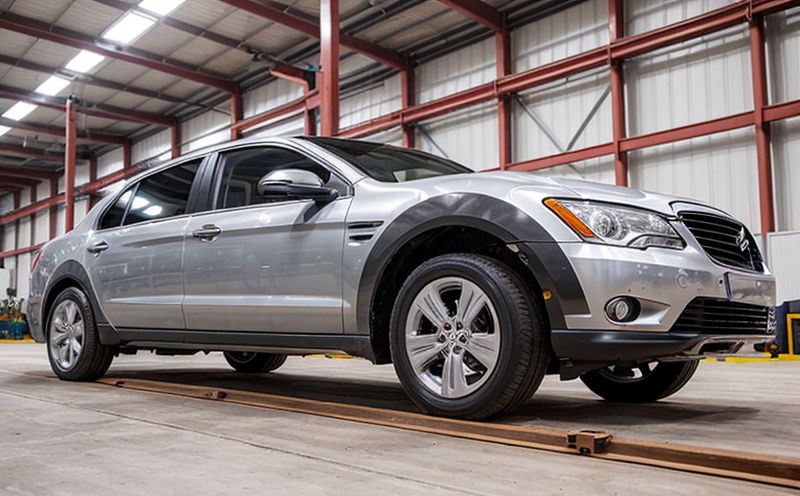DIN EN 10002 Mechanical Properties of Metals
In the realm of industrial manufacturing and processing testing, ensuring that metals meet stringent mechanical property standards is crucial. DIN EN 10002 represents a set of European standards specifying the mechanical properties of various types of metal products. These tests are particularly important for sectors where precision and reliability are paramount, such as aerospace, automotive, construction, and heavy machinery manufacturing.
The standard covers a wide range of mechanical testing methods designed to evaluate critical parameters like tensile strength, yield strength, elongation, and hardness. Compliance with DIN EN 10002 ensures that metal components meet the necessary quality benchmarks demanded by regulatory bodies worldwide. This service is essential for manufacturers who need to ensure their products are safe, reliable, and perform optimally under various conditions.
Our laboratory uses state-of-the-art equipment and follows stringent protocols to provide accurate results. We employ experienced technicians familiar with all aspects of DIN EN 10002 testing, ensuring that each specimen is prepared correctly and analyzed thoroughly. The precision of these tests is critical for industries where even minor deviations can lead to significant safety issues or product failures.
Understanding the nuances of DIN EN 10002 helps in optimizing production processes, identifying potential weaknesses early on, and maintaining consistent quality across batches. For instance, a metal component that fails to meet these standards could potentially lead to costly recalls or damage to reputation. By adhering strictly to this standard, manufacturers can avoid such pitfalls.
One of the key aspects of DIN EN 10002 is its emphasis on reproducibility and repeatability. This ensures that the test results are consistent across different laboratories and batches. The standard specifies detailed procedures for specimen preparation, testing conditions, and data analysis to minimize variability in outcomes.
Another critical component of DIN EN 10002 is the use of appropriate test methods tailored to specific metal types. For example, certain metals may require specific heat treatments or cooling rates before being tested to ensure accurate results. The standard provides guidance on these variables, ensuring that each specimen is tested under optimal conditions.
Compliance with DIN EN 10002 also extends beyond just the mechanical properties of metal components. It encompasses a holistic approach to quality assurance, addressing aspects such as surface finish, chemical composition, and heat treatment. This comprehensive testing ensures that every aspect of the metal product contributes to its overall integrity and performance.
The importance of DIN EN 10002 cannot be overstated in today’s competitive manufacturing environment. It serves not only as a benchmark for quality but also as a tool for continuous improvement. By adhering to these standards, manufacturers can enhance their reputation, gain market advantage, and ensure long-term customer satisfaction.
Scope and Methodology
DIN EN 10002 covers several types of mechanical tests designed to assess the structural integrity and performance characteristics of various metal products. The scope includes tensile testing, hardness testing (Rockwell, Brinell), impact testing (Charpy, Izod), and bend testing.
- Tensile Testing: This involves pulling a specimen until it breaks to determine its tensile strength and elongation. Specimens are typically prepared according to the standard's specifications to ensure accurate results.
- Hardness Testing: Hardness is measured using different scales depending on the metal type. Rockwell hardness testing, for instance, uses a diamond indenter to measure the depth of indentation made in the surface of the specimen.
- Impact Testing: This method evaluates the energy absorbed by a metal when it undergoes impact loading. It is crucial for determining the toughness and ductility of the material.
- Bend Testing: Also known as notched bar testing, this assesses the ability of a specimen to withstand bending without fracturing or cracking.
The methodology outlined in DIN EN 10002 ensures that all tests are conducted under controlled conditions to minimize variability. This includes precise control over temperature, humidity, and test speeds. The standard also provides guidelines for specimen preparation, including dimensions, surface finish, and heat treatment if necessary.
Our laboratory uses advanced testing equipment capable of performing these various tests with high precision and accuracy. Our technicians are trained to follow the detailed procedures specified in DIN EN 10002, ensuring that each test is conducted under optimal conditions. This attention to detail guarantees reliable and reproducible results, which are essential for making informed decisions about product design and manufacturing processes.
Customer Impact and Satisfaction
- Better Product Quality: By adhering to DIN EN 10002, manufacturers can produce higher quality products that meet international standards, enhancing customer satisfaction.
- Increased Market Share: Compliance with this standard can attract more customers, especially in sectors where reliability is critical. This leads to increased market share and profitability.
- Improved Reputation: Consistent compliance with DIN EN 10002 helps build a strong reputation for quality and reliability, which is essential for maintaining long-term relationships with customers.
Our clients have reported higher levels of customer satisfaction following successful completion of DIN EN 10002 testing. By ensuring that their products meet these stringent standards, they are able to provide reliable components that contribute to the overall quality of end-user products. This not only enhances the reputation of our clients but also strengthens their position in competitive markets.
International Acceptance and Recognition
DIN EN 10002 is widely recognized across Europe and internationally, making it a valuable tool for manufacturers seeking to comply with global standards. Its acceptance ensures that test results are valid and reliable in various regions.
- Eurozone Compliance: DIN EN 10002 aligns closely with European Union regulations, ensuring seamless compliance across the Eurozone.
- Global Recognition: Many countries outside Europe also accept these standards due to their rigorous and consistent approach. This broad acceptance enhances a manufacturer’s global reputation.
The widespread adoption of DIN EN 10002 reflects its importance in ensuring that metal products meet the highest quality benchmarks. Its recognition by international bodies further reinforces its value for manufacturers aiming to operate on a global scale.





